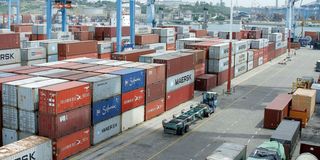Curious case of KPA plan to join last mile cargo delivery

Cargo containers at the Port of Mombasa in September last year.
The recent announcement by Kenya Ports Authority (KPA) that it planned to become a full-fledged logistics player, offering end-to-end transport and last-mile deliveries through a partnership with a private Chinese company, has sent shockwaves through the industry.
At the heart of the concerns in this on-and-off plan is the original contract itself, skewed in favour of the private firm. KPA's arguments regarding improved port efficiency, lower freight costs, and reduced demurrage contradict stakeholder concerns, raising questions on motives behind this venture.
Second is about the decision-making process and whether the KPA board was involved in awarding the initial exclusive rights to the private company.
Isn’t KPA overstepping its core mandate by venturing into the last-mile delivery business? The primary function of KPA is to manage and operate Kenya’s port facilities. Deviating from this core responsibility could potentially divert crucial resources and attention away from the efficient management of port operations.
The KPA move, if implemented, could have repercussions on operations of the Standard Gauge Railway (SGR), a critical component of Kenya's transportat infrastructure. The potential negative impact on SGR could disrupt the established supply chain, jeopardising the livelihoods of hundreds of businesses relying on last-mile operators.
The Kenya International Freight & Warehousing Association (KIFWA), representing over 1,200 clearing and forwarding firms, has expressed opposition to KPA's plan. KIFWA sees this move as a significant threat to local businesses, arguing that the exclusive deal may favour a single multinational company at the expense of the numerous local players. In response, KIFWA has threatened a major strike, which could have severe consequences.
Moreover, the decision by KPA contradicts a presidential directive that all port functions revert to Mombasa to prevent job losses and avoid introducing unnecessary bottlenecks in port operations.
Regardless of the orchestrators, the plan does not appear to be well thought out.
Critics argue that there is no void in the transport and logistics sector in Kenya, questioning the value a monopolistic foreign player could bring and the issues they aim to address. Introducing an external entity may not necessarily resolve existing challenges within the sector.
Further, voices against the KPA’s expansion into the last-mile delivery business emphasise the need for the organisation to adhere to its core mandate rather than diversify into unfamiliar territory.
In light of these concerns, KPA management should reassure Kenyans and the larger East African community before engaging in direct competition with its own customers in the transport and logistics services.
The author is an avid commentator on transport and logistics issues
The proposed outcomes or solutions include ensuring timely and efficient vessel berthing to address the existing delays for containerised vessels at the port. Additionally, KPA should eliminate challenges and bottlenecks associated with container loading, transfers, and scanning at the Mombasas Port.
The enhancement of port safety and security should also be emphasised. These assurances are considered essential prerequisites as opposed to KPA’s ambitious plan to expand into the last-mile delivery sector.
After KPA faced a barrage of criticism it has decided to have a fresh look at the tender, which in itself solves nothing. Any player who is selected to enter the end-to-end goods delivery business will face insurmountable hardships by trying to elbow out over 1,200 established players in the transport and logistics sector.
Instead of venturing into unfamiliar territory, KPA should address existing challenges within its jurisdiction and collaborate with key stakeholders, including the SGR operations, to enhance overall port efficiency and services.





